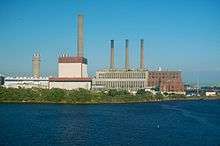Mystic Generating Station
| Mystic Generating Station | |
|---|---|
 Mystic Generating Station from across the Mystic River | |
 Location of Mystic Generating Station in Everett, Massachusetts | |
| Country | United States |
| Location | Everett, Massachusetts |
| Coordinates | 42°23′29″N 71°04′01″W / 42.39139°N 71.06694°WCoordinates: 42°23′29″N 71°04′01″W / 42.39139°N 71.06694°W |
| Status | Operating |
| Owner(s) | Exelon |
| Operator(s) | Exelon Generation Company, LLC, a subsidy of Exelon[1] |
| Power generation | |
| Nameplate capacity | 2,002 MW[2] |
|
Website Official Website | |
The Mystic Generating Station is a power station in the state of Massachusetts which has the highest nameplate capacity of any station in the state.[3] It is capable of burning both natural gas and petroleum, but mostly burns natural gas.[2]
The plant currently consists of eight separate generating units; Mystic 8 and 9 are six natural gas units which can produce 690.9 MW, Mystic 7 is a natural gas or petroleum unit which produces 577.6 MW, and Mystic Jet is small petroleum fueled unit which produces 8.6 MW in periods of high demand.[2]
History
Mystic Generating Station was originally owned and operated by Boston Edison after its construction in the early 20th century. It originally operated three natural gas units (Mystic 1-3) which have since been decommissioned. In the 1950s, the station was expanded to include three additional units (Mystic 4-6) which had a combined output of 468 MW until their retirement in 2003. Mystic 7 was constructed in 1975 and remains the oldest operating unit at the station. Mystic 8 and 9 were constructed in 1999 and make up the majority of the station's electrical production.[4]
In the mid 1990s, the state of Massachusetts began to deregulate the electrical market.[5] This led to the sale of the Mystic Generating Station to Sithe Energies who started a large capital investment in the construction of Mystic 8 and 9 which was completed in 2003.[1] Sithe was acquired by Exelon in late 2003[4] who ran into financial difficulties which resulted in BNP Paribas taking control of the station. BNP Paribas sold the station soon after its acquisition to Boston Generating. Boston Generating ended up declaring chapter 11 bankruptcy in 2010 and was sold to Constellation Energy.[6] Constellation Energy and Exelon merged in March 2012, returning ownership to Exelon.[4][7][8] Exelon continues to operate the station.
Recently, the Toxics Action Center has targeted the Mystic Generating Station as one of the five largest polluting power stations in the state.[9] Other groups have also become concerned that the plant relies too heavily on Distrigas Liquefied Natural Gas from Yemen which has been experiencing political unrest.[10]
See also
References
- 1 2 "New Exelon Power Plant Providing Clean Energy to Boston Area". prnewswire. Retrieved 29 April 2015.
- 1 2 3 "Mystic Generating Station". Exeloncorp.com. Exelon. Retrieved 29 April 2015.
- ↑ SIEMINSKI, ADAM. "STATEMENT OF ADAM SIEMINSKI ADMINISTRATOR ENERGY INFORMATION ADMINISTRATION U.S. DEPARTMENT OF ENERGY Before the SUBCOMMITTEE ON ENERGY AND POWER COMMITTEE ON ENERGY AND COMMERCE U. S. HOUSE OF REPRESENTATIVES" (PDF). energy.gov. Committee on Energy and Commerce. Retrieved 29 April 2015.
- 1 2 3 "Power Plant of the Week - Mystic Generating Station". Energytariffexperts.com. Retrieved 29 April 2015.
- ↑ Bride, James. "Sorting out the cost of green energy". Commonwealthmagazine.org. Retrieved 29 April 2015.
- ↑ Jeffrey, Donald; McLaughlin, David. "Boston Generating Sale to Constellation Moves Ahead". Bloomberg.com. Retrieved 29 April 2015.
- ↑ Cho, Hanah. "Maryland PSC approves Constellation sale to Exelon". Baltimoresun.com. Retrieved 29 April 2015.
- ↑ "Stock Watch: Exelon Corporation (NYSE:EXC)". themarketsdaily.com. Retrieved 29 April 2015.
- ↑ Ailworth, Erin. "The end of the coal era in Massachusetts". Bostonglobe.com. The Boston Globe. Retrieved 29 April 2015.
- ↑ Ailworth, Erin. "Unrest in Yemen may result in local LNG shortage". bostonglobe.com. The Boston Globe. Retrieved 29 April 2015.